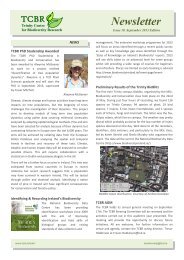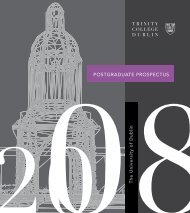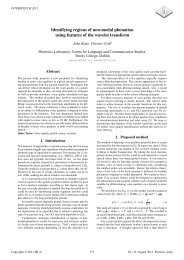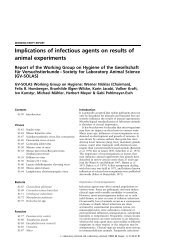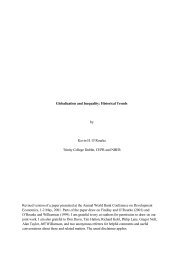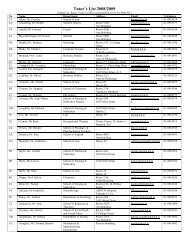Conference Programme (PDF, 1019KB) - Trinity College Dublin
Conference Programme (PDF, 1019KB) - Trinity College Dublin
Conference Programme (PDF, 1019KB) - Trinity College Dublin
You also want an ePaper? Increase the reach of your titles
YUMPU automatically turns print PDFs into web optimized ePapers that Google loves.
abstracts by stream and session<br />
The empirical analysis focuses on one main example of transnational, border-crossing activities that is visits to the country of origin.<br />
Descriptive analyses reveal that a significant proportion of the immigrant population in Germany is transnationally active. With respect<br />
to the relation of integration and transnational activities, the application of longitudinal data analysis (random and fixed effects<br />
regression models) shows that those immigrants who are economically well integrated and at the same time not well integrated on other<br />
dimensions (e.g. cultural or emotional) are the most likely to visit their country of origin and spend considerable amounts of time there.<br />
However, this relation is not unidirectional, as further evidence suggests that transnational involvement also has important implications<br />
for subsequent integration into the receiving society. For instance, immigrants who frequently visit their country of origin have lower<br />
German language skills.<br />
Therefore, systematically incorporating transnationalism into models of immigrant integration can advance our understanding of the<br />
complex processes and paths of immigrant integration.<br />
Investigating policy effects, mission impossible? A modest attempt at investigating the effects of integration policies on the sociocultural<br />
integration of immigrants.<br />
Evelyn Ersanilli, University of Oxford, UK<br />
There is ongoing political debate on the type of policies that are best suited to stimulate immigrant integration. Numerous studies<br />
have compared integration policies across Europe (e.g. Brubaker 1992; Castels, 1995; Koopmans et al. 2005; Geddes & Niessen, 2005;<br />
Bauboeck et al. 2005), but few of these studies have looked at the impact of policies on actual levels of immigrant integration. Large-N<br />
studies have compared immigrant integration across countries (e.g. Van Tubergen 2005), however they have used rather coarse indicators<br />
of policies such as years in government of Social Democratic parties. This paper presents the results of a comparative study of the sociocultural<br />
integration of Turkish immigrants and their descendants in three countries that are generally seen as exponents of different<br />
types of integration policies, namely France, Germany and the Netherlands. Small-N studies are generally better equipped to investigate<br />
the contents of policy differences, but they are often troubled by a large amount of confounding variance. Countries do for instance not<br />
only differ in their integration policies but also in the definition and composition of their immigrant population. The data presented in this<br />
paper were collected using a quasi-experimental design that limits the sources of confounding variance. The data were collected on the<br />
same narrowly circumscribed target population using the same sampling techniques in each of the three countries. Several studies have<br />
shown the effect of country of origin on socio-cultural integration. The target group therefore consists of only immigrants from Turkey. To<br />
minimise effects from different regional migration patterns, the target group is further limited to immigrants from two regions, namely<br />
East-Central and South-Central Anatolia. At the time of guest-worker migration the immigration regulations in France, Germany, and<br />
the Netherlands were fairly similar. Since then these regulations have diverged. To minimise the impact of selections effects, the target<br />
group consists of only Turkish immigrants who arrived in the time of guest-worker migration (i.e. before 1975) and their adult children.<br />
Three hypotheses on the relation between policies and socio-cultural integration are tested. The results indicate that policies that grant<br />
immigrants a high degree of individual equality have a positive impact on socio-cultural integration. Policies that accommodate diversity<br />
seem to have a negative effect, with the exception of host country identification. The paper ends with a discussion of several alternative<br />
explanations of the findings and suggestions for further research.<br />
Immigrants’ Confidence in Criminal Justice Institutions<br />
Peter Mühlau, <strong>Trinity</strong> <strong>College</strong> <strong>Dublin</strong>, Ireland<br />
*Antje Roeder, <strong>Trinity</strong> <strong>College</strong> <strong>Dublin</strong>, Ireland<br />
What determines the confidence of immigrants in criminal justice institutions? Using pooled data from the four rounds of the European<br />
Social Survey, first and second generation immigrants’ trust levels are compared to those of the native population to examine the role of<br />
various factors linked to individual and immigrant group characteristics, as well as factors related to the host and origin country. Most<br />
importantly, we examine the actual quality of criminal justice institutions in the host country, the effects of discrimination and social<br />
exclusion on trust, and the role of dual frames of reference linked to the quality of the legal system in the country or origin.<br />
Real and perceived discrimination of ethnic minorities and immigrant communities by police forces as well as the overrepresentation of<br />
certain minority groups in the legal justice system in many countries are expected to lead to lower trust amongst some immigrant groups,<br />
which is anticipated to impact particularly on those of different ethnic background than the majority population and lower socio-economic<br />
status. This may be balanced to some extent by a generally more positive evaluation of the quality of these institutions by immigrants<br />
from countries with weak criminal justice institutions if they compare the host country institutions to those of their respective countries of<br />
origin. This effect is expected to fade over time as the origin country experience becomes more distant, and as immigrants adopt a more<br />
similar evaluative framework to the native population.<br />
91



